A Quote by Allen W. Wood
No theory about our bodies as mere objects of observation and calculation (as distinct from partners in communicative interaction, assumed to be free) can comprehend human nature.
Related Quotes
It's only when movement becomes the most natural state in our lives that we can finally begin to enjoy the motion. And it's only when standing still becomes impossible that we can finally embrace the kinds of changes that are inevitable in our lives.
We were not designed to stand still. If we were, we'd have at least three legs. We were designed to move. Our bodies are bodies that have walked across vast continents. Our bodies are bodies that have carried objects of art and war over great distances. We are no less mobile than our ancestors. We are athletes. We are warriors. We are human.
Yes, I am very lucky, but I have a little theory about this. I have noticed through experience and observation that providence, nature, God, or what I would call the power of creation seems to favor human beings who accept and love life unconditionally, and I am certainly one who does with all my heart.
The inward persuasion that we are free to do, or not to do a thing, is but a mere illusion. If we trace the true principle of our actions, we shall find, that they are always necessary consequences of our volitions and desires, which are never in our power. You think yourself free, because you do what you will; but are you free to will, or not to will; to desire, or not to desire? Are not your volitions and desires necessarily excited by objects or qualities totally independent of you?
If the concept of consciousness were to fall to science, what would happen to our sense of moral agency and free will? If conscious experience were reduced somehow to mere matter in motion, what would happen to our appreciation of love and pain and dreams and joy? If conscious human beings were just animated material objects, how could anything we do to them be right or wrong?
In arriving at the relevant theory about the specifics of our faculty of vision we will presumably use our eyes to gather relevant data. Based on such data we come to know about the optic nerve, the structure of our eyes, the rods and cones, etc., so as to explain how it is that vision gives us reliable access to the shapes and colors of objects around us. In reliably arriving at that theory we thus exercise the very faculty whose reliability is explained by the theory. There is no vice in this sort of circularity.
Perhaps that is our doom, our human curse, to never really know one another. We erect edifices in our minds about the flimsy framework of word and deed, mere totems of the true person, who, like the gods to whom the temples were built, remains hidden. We understand our own construct; we know our own theory; we love our own fabrication. Still . . . does the artifice of our affection make our love any less real?
It is part of our human nature to want to be liked. It is part of our human nature to worry about what others think of us. It is an attribute of greatness and of American exceptionalism to not surrender to our nature, but to be guided by an inner calling to persevere and to prevail, no matter the personal cost.


































